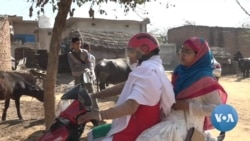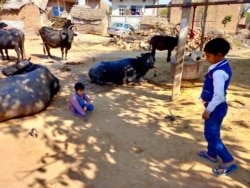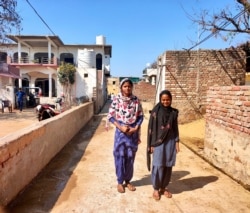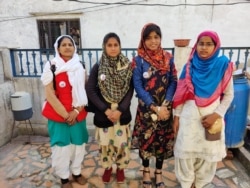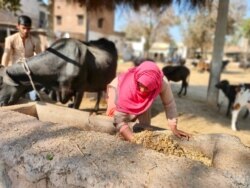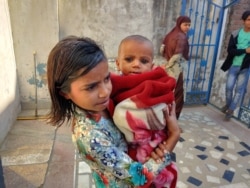Wasima Khan dropped out of school six years ago. She is not an exception but the norm in Nuh, a district in northern India where the female literacy rate of about 30% is barely half the national average.
The reason the 19-year-old left her studies is the same as in most village homes. “I had to help my mother look after my younger brothers and sisters and do housework,” said Khan. “And there was no middle school here.”
While boys in Papika, in Haryana state, walk to the nearest high school, about four kilometers away, daughters are not allowed to venture outside the tiny village.
Tucked just a few kilometers away from the nearest highway, Pipaka is untouched by the development that has transformed surrounding areas.
Women work in fields or tend to animals, young girls fetch water, a group of children play, while men sit outside their homes soaking in the sun after a chilly winter.
Now a group of girls from the Muslim-dominated community who made it to college by overcoming patriarchal prejudices is spearheading a campaign to get more girls into school.
Every Sunday, they fan out in Pipaka and other villages to talk to neighbors and friends about why they should allow their daughters to study.
They persuade Wasima Khan’s mother to keep her younger daughter at school. They ease her concerns that educated girls will want to marry educated men who demand a bigger dowry, a challenge for low-income families who see no incentive in educating girls.
Arastoon, a postgraduate student in history, points out her college education has given her the confidence to combat the widely prevalent practice. “I will only marry into a family which does not demand dowry," she said, "however well-to-do they maybe.”
As they advise Wasima Khan that she can resume her studies, there is a momentary flicker of hope in the girl whose childhood goal was to join the police. She is uncertain whether that will happen, but vows to do whatever she can to ensure that her sister does not drop out. “I loved my classes,” she said wistfully. “But I was helpless.”
The Selfie with Daughter Foundation, the non-profit organization spearheading the campaign to empower and educate women in these patriarchal villages, aims to bring grassroots change by showcasing the handful of success stories from these villages as role models for other families. “
In these villages, women are victims of many social evils such as harassment for dowry, divorce and bigamy,” said Sunil Jaglan who runs the Selfie with Daughter Foundation. “The voices that can end this treatment should be that of their own daughters rather than that of people who come from outside.”
That is why Rizwana Khan begins her campaign from her own home, persuading her extended family to educate their daughters.
She tells these women that qualified girls could be a boon for villages where women are at a huge disadvantage – they are not allowed to interact with male lawyers, be taught by male teachers or get treated by male doctors.
Witnessing the massive problems created by such social restrictions as they grew up fueled their own ambitions.
Rizwana, who is training to be a nurse, fell seriously ill when she was a teenager. Her treatment posed a challenge – her parents were not literate and medical facilities in the area were abysmal. That gave her the grit and determination to pursue her own education.
She said she will bring medical aid to women in the backward area, a goal her father encouraged her to pursue even selling some assets to fund her nursing degree. “They don’t want to educate their daughters, but if women are ill, they want a lady doctor. How will that happen?” Khan said wryly.
Another girl participating in the campaign wants to teach in a local school. “I tell them that if your daughters don’t attend schools, how will they find female teachers?” said Shahnaz Bano.
It is a message that they reiterate as they go from house to house pointing out how they had to fight with their families for their right to study. Khan’s parents did not have enough money, but seeing her determination, sold some assets to fund her college. In other cases, even when parents agreed to let them study, neighbors and villagers raised objections. Overcoming such prejudices has imbued with them confidence.
Indeed, while most boys who complete college move away to pursue better opportunities outside these villages, these girls hope to use their skills and education in their community.
Anjum Islam, who is pursuing law studies, wants to provide free legal aid to women. “I wont do that for men”, she adds firmly.
But her bigger goal is to change mindsets. “Here men think that women are only meant to do housework and give birth to children,” said Islam passionately. “We have to change this thinking. If we have equality under the law, how can society have this gender discrimination?”
The campaign has begun making a dent by inspiring some women, who do most of the work both at home, in fields and with dairy animals.
Thirty-year-old Aslima Khan is determined to educate her three daughters. The reason – to ensure they can escape her own life's experience of backbreaking drudgery. “All I do the whole day is slog with animals, fetch firewood, sweep, cook and wash dishes,” she said. “If I had studied I would have been saved from this.”
The battle to get more girls to complete school and enter college will be slow, but it has begun.
And Jaglan hopes the efforts led by local girls to break patriarchal norms will help the district become a role model for other such areas. “Throughout the country Nuh is synonymous with backwardness. I hope this campaign will change that perception.”




